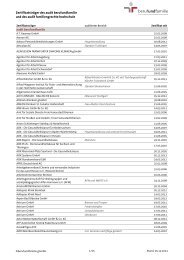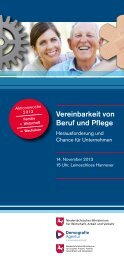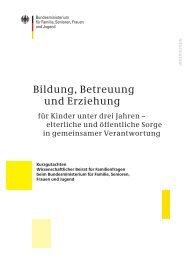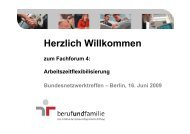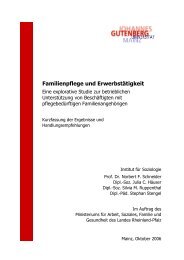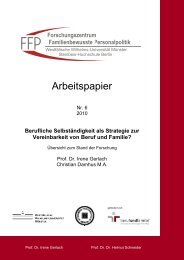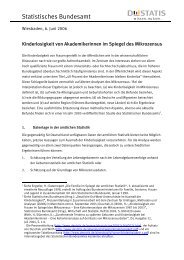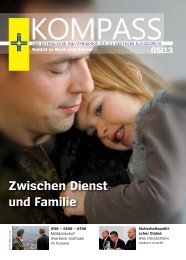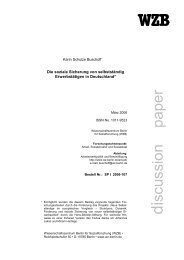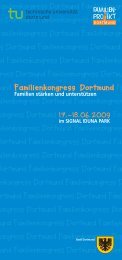Perspektive Wiedereinstieg - Beruf & Familie gGmbH
Perspektive Wiedereinstieg - Beruf & Familie gGmbH
Perspektive Wiedereinstieg - Beruf & Familie gGmbH
Sie wollen auch ein ePaper? Erhöhen Sie die Reichweite Ihrer Titel.
YUMPU macht aus Druck-PDFs automatisch weboptimierte ePaper, die Google liebt.
Executive Summary<br />
This report presents findings of the quantitative and qualitative evaluation of the pilot program<br />
“Perspective of Women’s Reentry into the Labor Market”, conducted by the Institute<br />
for Employment Research (IAB). The pilot program aims at supporting the reentry of women<br />
into the labor market after a familyrelated absence from employment for at least three years.<br />
Managed by the Federal Ministry for Family Affairs, Senior Citizens, Women and Youth in<br />
cooperation with the German Federal Employment Office, the program was implemented<br />
across Germany by 28 project executing agencies with partially different concepts. This report<br />
refers to the first funding period of the program from March 2009 to February 2012.<br />
The findings of the quantitative evaluation are based on altogether five panel surveys of two<br />
cohort samples of women participating in the model program as well as a potential comparison<br />
group of women who are clients of the Federal Employment Agency (nonparticipating women).<br />
Despite a careful selection of similar nonparticipating women, both groups will probably consist<br />
of women with different labor market aspirations. The program aims at women who are in need<br />
of orientation services to reenter the job market. Nonparticipating women have at least had<br />
contact to a jobcenter. However, this does not necessarily imply that they are keen to reenter<br />
the labor market, and they might be in need of orientation services, too.<br />
What characterizes women who face the decision to re-enter the labor market after a family<br />
related break? Almost all of the interviewed women had completed a professional education or<br />
have an academic degree. Participants are on average better qualified than potential comparison<br />
persons. Furthermore, participants have a higher net household income; they are married<br />
or live in a partnership more often and have been out of employment for longer – every other<br />
participant had interrupted her career for more than 10 years. They are also involved in voluntary<br />
work more often than nonparticipating women. About 80 percent of the interviewed<br />
women – participating as well as nonparticipating women – worked fulltime before withdrawing<br />
from the labor market. Almost all interviewees named child care as a reason for taking<br />
the break. Nearly ten percent (also) named caring for persons in need of care. Important reasons<br />
for reentering the labor market are the desire for personal development and for making<br />
use of one’s own skills; financial motives are less important for participating women than for<br />
nonparticipants.<br />
How did the re-entry process proceed? Participating women mostly learned about the program<br />
“Perspective Reentry“ from the media. But also information centres, work agencies as well as<br />
references from other women who already reentered the labor market play an important role.<br />
Participating women mostly use the orientationmodules, often combined with other modules.<br />
More than three quarters of participating women have been very satisfied or satisfied with<br />
the encouragement – more than the women who were solely clients of the Federal Employment<br />
Agency. The participants’ motivation for jobseeking was lower before the beginning of<br />
funding, compared to the motivation of nonparticipating women before registration at the<br />
German Federal Employment Office or jobcenter – it increased, however, more strongly over<br />
time. Participating women (to a greater extent) as well as nonparticipating women are willing<br />
to make concessions for a new job: 70 to 80 percent would take up a job for which they are<br />
overqualified. But only ten percent would change their place of residence for a new job.





